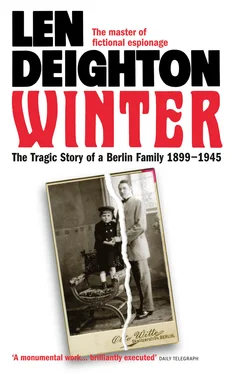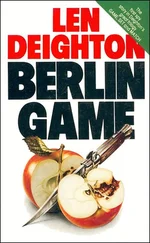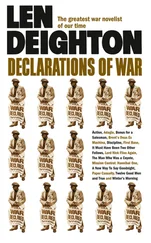In attempting to come up with a concept for the cover design for Winter, Len Deighton’s saga of a Berlin family set in the first half of the twentieth century, I sought a striking image that would express the outcome of the Winter family’s story. I recalled a photograph in my wife Isolde’s family album of her father as a child dressed in a sailor suit standing beside his father. This image seemed to fit the time and place precisely. By tearing the photograph apart it implied the outcome of their relationship; and in a metaphorical sense it would also suggest what lay ahead for the city, and indeed the entire country. Sometimes the simplest of images are the most effective.
The related ephemera on the back cover includes a number of objects of the period taken from my personal collection, including a gramophone needle tin (which was featured in my book Phonographics) that has the Berlin dealer’s name on the lid; its contents still containing a few needles, a small button and an unused Adolf Hitler postage stamp. Also appearing is a china Zeppelin ornament, several early postcards including one of Graf Zeppelin and one of the Brandenburg gate, plus a German bank note. The group photograph is of my wife’s mother’s family.
The Nazi era stamp on the book’s spine commemorates Graf Zeppelin and his airship LZ2, one of many that did not survive to make a second flight. Fortunately, when she was driven to the ground in 1906 by winds too strong for her engines, no one was hurt. But this was rarely the case.
Arnold Schwartzman OBE RDI
The Tragic Story of a Berlin Family 1899–1945

This novel is entirely a work of fiction. The names, characters and incidents portrayed in it are the work of the author’s imagination. Any resemblance to actual persons, living or dead, events or localities is entirely coincidental.
Published by HarperCollins Publishers Ltd 1 London Bridge Street London SE1 9GF
www.harpercollins.co.uk
First published in Great Britain by Hutchinson Ltd 1987
WINTER. Copyright © Len Deighton 1987
Len Deighton asserts the moral right to be identified as the author of this work
Introduction copyright © Pluriform Publishing Company BV 2010
Cover designer’s note © Arnold Schwartzman 2010
A catalogue record for this book is available from the British Library
All rights reserved under International and Pan-American Copyright Conventions. By payment of the required fees, you have been granted the nonexclusive, nontransferable right to access and read the text of this ebook on-screen. No part of this text may be reproduced, transmitted, downloaded, decompiled, reverse-engineered, or stored in or introduced into any information storage and retrieval system, in any form or by any means, whether electronic or mechanical, now known or hereinafter invented, without the express written permission of HarperCollins ebooks
HarperCollinsPublishers has made every reasonable effort to ensure that any picture content or written conten in this ebook has been included or removed in accordance with the contractual and technological constraints in operation at the time of publication
Source ISBN: 9780586068953
Ebook Edition © JUNE 2010 ISBN: 9780007387212
Version: 2017-08-18
Cover designer’s note
Title Page Len Deighton Winter The Tragic Story of a Berlin Family 1899–1945
Copyright
Introduction
Prologue
1899
‘A whole new century’
1900
A plot of land on the Obersalzberg
1906
‘The sort of thing they’re told at school’
1908
‘Conqueror of the air – hurrah!’
1910
The end of Valhalla
1914
War with Russia
1916
‘What kind of dopes are they to keep coming that way?’
1917
‘Not so loud, voices carry in the night’
1918
‘The war is won, isn’t it?’
1922
‘Berlin is so far away and I miss you so much’
1924
‘Who are those dreadful men?’
1925
‘You don’t have to be a mathematician’
1927
‘That’s all they ask in return’
1929
‘There is nothing safer than a zeppelin’
1930
A family Christmas
1932
‘Was that more shouting in the street?’
1933
‘We think something is definitely brewing over there’
1934
‘Gesundheit!’
1936
‘Rinse and spit out’
1937
‘You know what these old cops are like’
1938
‘Being innocent is no defence’
1939
‘Moscow?’ said Pauli
1940
The sound stage
1941
‘It was on the radio’
1942
‘I knew you’d wait’
1943
‘Happy and victorious’
1944
‘We’re all serious’
1945
‘It’s a labour of love’
Keep Reading
About the Author
Also by the Author
About the Publisher
This is how it started. It was Friday afternoon – exactly 2.20 pm – and the snow was falling. The flakes that hit the car’s windscreen were not the soft, watery sort that slide downwards and fade away like old soldiers. These were solid bullets of ice, perfectly formed and determined to stay put. These were German snowflakes. Our elderly Volvo was on the road heading west from Munich, with the cold waters of the Ammersee close at hand and my sons on the back seat politely starving to death. My wife was at the wheel. ‘The next place we see; we stop,’ I said. ‘It’s getting late. I don’t care if it’s just a currywurst van parked on the roadside.’
The ‘next place’ was the Gasthof Kramerhof. It was a typical Bavarian inn, with a large restaurant that attracted locals and a few well-kept rooms for travellers. It was sited well back from the road and had an extensive parking area, which is often a measure of an inn’s popularity. Now lunchtime had ended and there were no cars there. The loops of tyre tracks that marked their departure were now disappearing under the continuing snowfall. But in such a Gasthof all travellers are welcome and mealtime lasts all day. Soon we were relishing a Bavarian meal: kraftbrühe – clear soup – followed by pork cutlets in a sour cream sauce with spätzle on the same plate. Had I been better informed about German food I might have guessed that the owners were Schwabs, for these were the long square-sided ‘pasta’ that is a delight of Schwabian cooking.
Outside, the snow was conquering the world. The sky was steely grey and descending upon the treetops. Stacked on the Volvo’s oversized roof rack, our bags and boxes now looked like a scale model of the Alps. What else was there to do? We stayed there for the weekend. That’s all it took for the Kramerhof to become our home and we remained there for many months. From the hotel room we moved one floor higher where I set up my portable typewriter in the attic rooms originally furnished for a mother-in-law. It was cramped under the steeply sloping roof and I banged my head a lot but this was the sort of Germany I wanted to write about. All the events of the neighborhood were celebrated there under our noses, from weddings – complete with amateur brass band – to hunting-dinners from which the smell of wine-rich venison drifted upwards to reach us in the early hours of morning.
My wife’s fluent German impressed the lady in the village post office and we soon knew everything about everyone. There was enough social life to furnish a dozen lurid novels. Retired military men abounded. I met a relative of General Gehlen, one of the very few spies who influenced history. The Kramerhof food was wonderful, the customers were entertaining and the owners became friends. They allowed us into the well-ordered kitchen where we learned how to make Schwabian spätzle and much more.
Читать дальше













